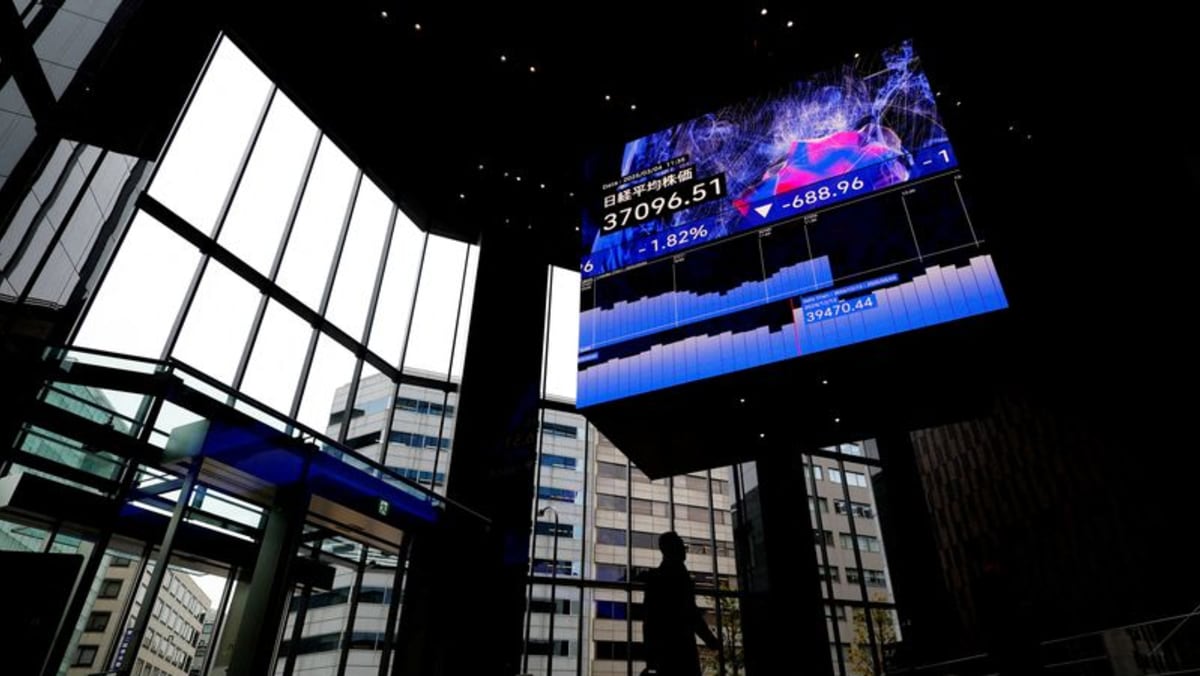SYDNEY :World share markets were in a tailspin on Monday after U.S. President Donald Trump said tariffs would essentially cover all countries, stoking worries a global trade war could lead to recession.
Trump’s comments to reporters on Air Force One seemed to dash hopes the levies would be more limited. Trump is due to receive tariff recommendations on Tuesday and announce initial levels on Wednesday, followed by auto tariffs the day after.
Seeking any safe harbour from the trade storm, investors piled into sovereign bonds and the Japanese yen, while lifting gold prices to another all-time high.
S&P 500 futures lost 0.8 per cent, extending Friday’s rout, while Nasdaq futures shed 1.4 per cent.
EUROSTOXX 50 futures fell 0.8 per cent, while FTSE futures and DAX futures were both down 0.5 per cent.
The European Union was ready to respond with tariffs of its own, German Chancellor Olaf Scholz said on Sunday, but there were also reports the block was preparing a list of concessions to offer to Trump.
“For the first time in years, we find ourselves genuinely worried about risk assets,” said Ajay Rajadhyaksha, head of rates markets at Barclays.
“If policy chaos and trade wars worsen much further, a recession is now a realistic risk across major economies,” he added. “For the first time in many quarters, we favour core fixed income over global equities.”
Japan’s Nikkei led the rout in Asia, losing an eye-watering 4.1 per cent to a six-month low as automaker stocks continued to suffer fallout from Trump’s talk of 25 per cent tariffs on imported cars.
MSCI’s broadest index of Asia-Pacific shares outside Japan shed 1.9 per cent and South Korea 3.0 per cent.
Chinese blue chips fell 1.0 per cent as a survey showed manufacturing activity inched higher in March, much as analysts expected.
THAT “R” WORD
Many economists are worried that tariffs will hit the U.S. economy hard, even while limiting the Federal Reserve’s scope to cut rates by also lifting inflation in the short term.
“Recession risks have become elevated – to a 40 per cent probability – on concerns that aggressive U.S. policies hit business and household sentiment,” warned Bruce Kasman, chief economist at JPMorgan.
“With the latest tariff increases set to push U.S. core inflation above 4 per cent next quarter, a household sector with a healthy balance will need to show a willingness to lower its saving rate to cushion this blow.”
Analysts at Goldman Sachs now saw a 35 per cent chance of a U.S. recession, up from 20 per cent previously, saying they expected Trump to announce reciprocal tariffs that average 15 per cent across all U.S. trading partners on April 2.
Data out on Friday underlined the risks as a key measure of core inflation rose by more than expected in February while consumer spending disappointed.
That raised the stakes for the March payrolls report due on Friday where any outcome below the 140,000 gain expected would only add to recession fears. Also due are a rush of surveys on factories and services, along with figures on trade and job openings.
Bond investors seemed to be betting the slowdown in U.S. economic growth will outweigh a temporary lift in inflation and prompt the Fed to cut rates by around 79 basis points this year.
This, combined with a flight from risk assets, saw 10-year Treasury yields drop to 4.206 per cent while two-year yields hit 3.861 per cent.
The outlook for rates could become clearer when Fed Chair Jerome Powell speaks on Friday, following a host of other Fed speakers this week.
The drop in yields saw the dollar ease 0.6 per cent to 148,90 yen, while the euro held at $1.0835. The dollar index held at 103.880, having slipped for the previous two sessions.
The perceived safety of gold saw the metal hit another all-time high at $3,111 an ounce.
The risk of slower global growth was making itself felt on oil prices, offsetting comments from Trump that he would impose secondary tariffs of 25 per cent to 50 per cent on all Russian oil if he feels Moscow is blocking his efforts to end the war in Ukraine.
Brent slipped 30 cents to $73.33 a barrel, while U.S. crude dropped 31 cents to $69.05 per barrel.
(Editing by Shri Navaratnam and Lincoln Feast.)
